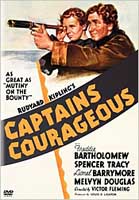 BUY IT AT AMAZON:
BUY IT AT AMAZON:
CLICK HERE!
STUDIO:
Metro-Goldwyn-Mayer
MSRP:
$13.99
RATED: NR
RUNNING TIME:
111 mins.
SPECIAL FEATURES:
•
Vintage Short – “The Little Maestro”
•
Classic Cartoon – “Little Buck Cheeser”
•
Leo is on the Air Radio Promo
• 2
Theatrical Trailers – Matinee and 1946 Re-issue
Adventures movies were more streamlined in simpler times, if only because those filmmakers molding them understood the details of plot than action that slams your head into a wall. The man behind such pursuits in Rudyard Kipling’s classic Captains Courageous was none other than Victor Fleming, whose duties really haven’t inspired much talk alongside other more competent directors of his era (like William Wyler and George Cukor). Fleming helped mold several pictures into our American iconography – The Wizard of Oz and when Cukor was unceremoniously fired by David O. Selznick, Fleming handled the reigns on Gone With the Wind quite graciously through his epic lens. And it’s with a rather telling tale of a young hooligan that Fleming was fairly-well suited for, in adventure of the high-seas variety.
The Flick
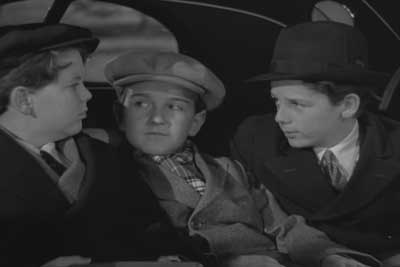
"And I don’t think you want me to go Ninja III on your ass…"
The snooty hooligan Freddie Bartholomew is the young Harvey Cheyne, a princely terror who justifies his mystical above-it-all status with great ease. If he doesn’t agree with you it’s onto his rich well-to-do father and he’ll surely purchase your auto dealerships and quickly fire your dad’s employees as retaliation. Things have naturally come easy for Harvey because – a. he’s richer than George Lucas, b. he’s accustomed to being waited on hand-and-foot, and c. his slimy tendencies have gotten him out of countless jams.
But his out-of-control behavior lands him back under the watchful gaze of Mr. Cheyne (Melvyn Douglas) and he quickly decides that in order to salvage his last bastion of relations with his only child, he must teach him how to become a man. The perfect setting for bonding might be a business trip on a luxury ocean liner for London, which the pair happily bound towards. And it’s when Harvey plummets overboard into the icy waters of the Atlantic when things veer tremendously off-course towards one large adventure.

The Poltergeist boat loved to boast at every moment.
He’s snatched out of the water by the fisherman Manuel (Spencer Tracey) and brought back to the ship We’re Here, of Gloucester, Massachusetts fame. Frail and beaten down by the ordeal, Harvey’s quick to regain his fighting strength and instantly demands the ship’s captain Disko (the great Lionel Barrymore) that he’s to be returned to his Poppa at once. The crew scoffs at such a request and Harvey soon realizes that he’s gotten in a situation no one bargained for. Stuck on We’re Here for the next three months (with poverty pay – like me!), Harvey must now contend with a drab life at sea – forced to actually (gasp!) work for a living. Harvey must now understand the plight of the working man, even if it means throwing temper tantrums at every possibility. But with Manuel backing him up and teaching him the ways of life in the process, Harvey might actually learn something besides getting handouts and thirty-dollar trysts.
The main focuses throughout Captains Courageous are the transformation of Harvey into a more tolerant man of society and its people, Manuel’s irrepressible lust for life, and naturally Fleming’s insistence on character and emotion more than the rollicking waves lapping at the boat’s bow. Fleming presents a very masculine troupe at sea – hardened to its fickle wood; his characters get along well because they’re out to perform a basic function: to work and survive while doing it. Not even a bratty child can come between them at their task, but Fleming makes sure to throw a few curveballs in each new development with an understated wink and nod. The characters throughout feel incredibly real – not only because they’re the only organic items playing out in front of some fairly slip-shod rear projection work, but because there’s no hint of pretentiousness in the dialogue, the situations, the moral lessons learned.
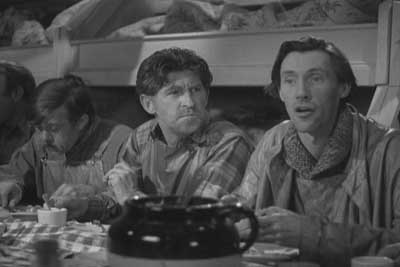
"So I says – "Hell No I won’t do American Pie 4."
Then I went bankrupt."
Freddie Bartholomew is arguably one of the best child actors of his era. His Harvey is a righteously evil creature starting off. He makes you angrier than when Greedo shots first, but once his transformation into becoming more tolerant and world-weary begins to take shape you believe it with every inch of your black heart. Not only does he not cop out with mugging for the camera, he doesn’t even make those puppy-like faces of death that burn villages with ease. Bartholomew feels as natural as one can in a very controllable environment. His curiously inquisitive nature towards Spencer can also be attributed to his heartfelt 180. Seeking Manuel as a surrogate father figure, Bartholomew’s natural attachment to Tracey’s hulking presence easily balances between the reasonable and the congenital.
As for Tracey’s Manuel, his embodiment of headstrong, spiritualistically simple, and paternal understanding make it one of his most interesting roles. Awarded the Academy Award for being one hair shy of almost delirious (he sings songs in a pseudo-Portuguese accent and wanders about spouting down-home-isms), Tracey’s Manuel is certainly a courageously humble figure, and one can instantly see where the very paternal attraction between a young boy searching for a bit of tough-love fathering could naturally be drawn towards. Manuel exhibits those classical fatherly instincts played out by the greats over time (with shades of Gregory Peck’s Atticus Finch – the premiere father figure of cinematic history), while Fleming makes sure to not overemphasize the relationship between surrogate and child. Tracey works small wonders in this role, so naturally I’m inclined to think it’s one of his better parts (although I do enjoy him immensely in Tortilla Flat).
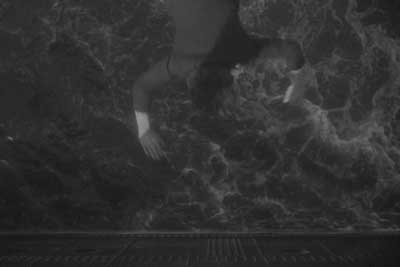
Geronimo, assholes!
Fleming, as I’ve mentioned, is never really recognized for his strengths as a craftsman of the highest filmic regard. In Captains Courageous his inherent understanding of the balance between the situations that occur between Bartholomew and Tracey offset the relatively thrilling adventure the tight-knit group of workers have out on We’re Here. It’s masterfully realized. I almost wish I had seen this film a little younger and a little less disgruntled with everything around me. It’s a grand tale told so irresistibly well in every regard.
In the end, Captains Courageous isn’t a masterpiece, but it’s a damn adventurous story of a young boy learning the ropes by a staunch headstrong man. I’d recommend it simply for its characters, who are sure to stick around in your head afterwards.
8.8 out of 10
The Look
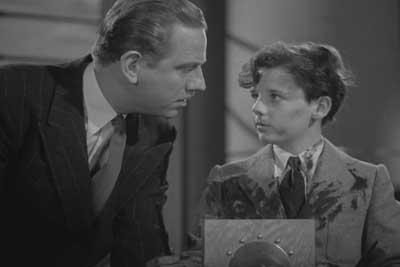
"You know Son, when the Circus Monkey flings its poo, that
doesn’t mean you should emulate that."
Presented in the film’s original aspect ratio of 1.33:1, Warner continues their par excellence in enhancing their older films with a very clear transfer and little artifacts clogging the way (although there are some damage marks via some scratching here and there). Blacks continually pop with boldness and grays are spectacularly varied throughout. It looks great.
8.7 out of 10
The Noise
What’s most noticeable is Franz Waxman’s rousing score throughout the film’s Dolby Digital 1.0 surround sound. Then there are the sound effects – waves crashing, timbers being shivered, and enough ritualistic males singing about being a terrible man to make you think you might be one. Overall, audible levels are clear and worthwhile.
8.8 out of 10
The Goodies
Included on the disc are these items:
The vintage short – “The Little Maestro” (runtime: 10:48) is first, which has a vertically challenged man finding himself ensconced in a typical nightclub act’s proceedings. The comedy throughout the short isn’t laugh-out-loud funny, but considering the mugging times in which it was crafted, it is quite enjoyable.
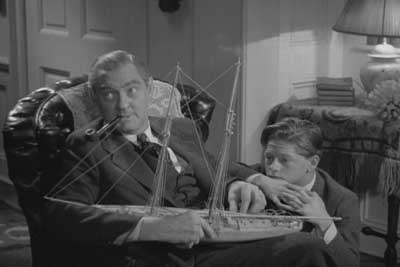
"I’ll show you a Schooner, ya dumb bastard… and
some of dat big-tittied Mermaid shit too!"
The classic cartoon “Little Buck Cheeser” (runtime: 7:40) I wasn’t very fond of, considering the relatively predictable way the mice constructed their spaceship to the moon – made out of cheese. The animation, on the other hand, is staggeringly beautiful, and for its age looks well beyond even my deviant dreams. The short’s flourishes are what really makes it interesting – from the nod to Melies’ own Voyage dans la Lune to the Rocketship straight out of Buck Rodgers. Those are what make the short bearable to sit through.
There’s also a Leo Is on the Air radio promo (runtime: 12:44) which basically recaps some of the dialogue from the film verbatim. If you’ve watched the film beforehand, it’s absolutely nothing new. The theatrical trailers – one is the Matinee Trailer (runtime: 2:28) and the other the 1946 re-issue Trailer (runtime: 2:46) both have their merits, but I was more particular to the sweeping music and rousing excitement of the 46 re-issue. The Matinee trailer has an old-timey trailer guy imparting his words of wisdom on you, and it’s fairly awesome as well.
Included are English subtitles as well. Typically, these shorts are becoming more and more standard on Warner’s older catalogue titles. Like Tony the Tiger says – they’re great.
8.0 out of 10
The Artwork
Classy and vintage. I’m a huge fan of the artistic drawing of both Tracey and Bartholomew on the cover, looking out towards adventure. It’s simple, easy on the eyes, and gives you a tiny clue into what to expect. For that, I’d say it’s quite effective.
8.7 out of 10
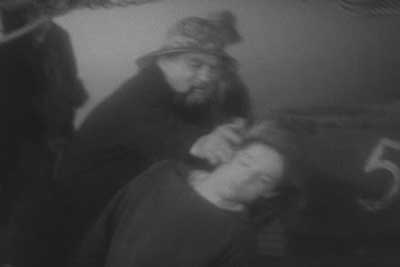
Ha-do-ken, Son!